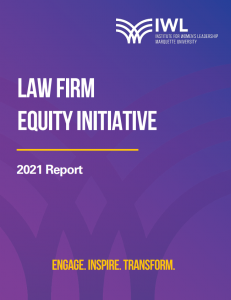 As part of Women’s History Month, the Marquette University Institute for Women’s Leadership released its first white paper, entitled Law Firm Equity Initiative, examining the status of women in the Milwaukee legal market. (This survey went out to all firms with over 10 attorneys in the metro area—more on methodology in the report itself.) I am honored to be the author of this report knowing that transparency is step one in bringing about any change.
As part of Women’s History Month, the Marquette University Institute for Women’s Leadership released its first white paper, entitled Law Firm Equity Initiative, examining the status of women in the Milwaukee legal market. (This survey went out to all firms with over 10 attorneys in the metro area—more on methodology in the report itself.) I am honored to be the author of this report knowing that transparency is step one in bringing about any change.
My motivation for doing this study came from watching the remarkable progress that companies in Wisconsin have made in the last few years in terms of placing women on their boards. Inspired by what transparency and peer pressure has accomplished in the corporate world, I hope that we can hold a mirror to our legal community and also ask what we can do better.
When I graduated law school (don’t ask—it was a long time ago) and did not see women in leadership roles, I was told it was a pipeline issue—just give it time and women would ascend to the heights of leadership once there were equal number of women graduating. So, has that story played out? Not so much.
The data in this report gives us all guidance for what change is needed to make the law profession one that is equally welcoming to all. Not surprisingly, women join law firms at a similar rate to that of graduating lawyers (about 44% here in Milwaukee) but then drop to 25% by 5 years in and drop again to half that by 15 years. This means that while associate numbers are rather robust for women, only 21% of equity partners are women, mirroring the national average. Yet some firms have performed well above that number with 25% or even 30% female equity partners. What are these firms doing that make a difference? Other highlights of the report include the fact that women are underrepresented in leadership roles within law firms and that women are seriously underrepresented among the top earners for law firms—again, with some firms having far more equitable numbers.
Press coverage has continued for the report (linking it to the RBG scholarship in MPS) and in general (which is great!) and, more importantly, I am excited by the law firms and general counsels that have reached out in order to consider next steps. As I said above, transparency is step one. Step two is thinking seriously about what we can do here in Milwaukee to change these numbers and get all law firms to the higher end of this range. Let’s make Milwaukee a destination city for women in law.
To do this, we need to stop pretending this is a pipeline issue or that this is primarily explained by women’s individual choices. This is a systemic problem which, therefore, needs some systemic change.
And I hope that our readers will reach out to talk more and think about what we can all do next!

Fantastic job acknowledging the progress being made while also reaffirming the need for systemic change to increase equity among women in leadership.